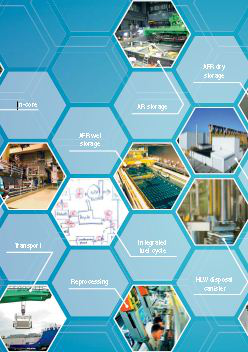Speaker
Dr
Konrad Linnemann
(BAM Federal Institute for Materials Research and Testing)
Description
Transport packages for spent nuclear fuel have to be assessed with respect to specific transport conditions which are defined in the safety regulations of the International Atomic Energy Agency. In general, gastight fuel rods constitute the first barrier of the containment system. The physical state of the spent fuel and the fuel rod cladding as well as the geometric configuration of the fuel assemblies are important inputs for the evaluation of the package safety under transport conditions. The objective of this paper is to discuss the methodologies developed by BAM for the assessment of spent fuel behavior within the approval procedure of German spent fuel package designs. In particular, cracks or failures in the fuel rod cladding can occur under transport conditions. These defects can cause the release of gas, volatiles, fuel particles or fragments into the cavity and have to be considered properly in safety analysis. Another spent fuel related issue is the transport of defective fuel rods. One concept is to use special quivers which can be handled like fuel assemblies. This concept requires additional assessments concerning drying, sealing and the mechanical and thermal design of such quivers. The package as a mechanical system is characterized by a complex set of interactions, e. g. between the fuel rods within the assembly as well as between the fuel assemblies, the basket, and the cask containment. This complexity together with the limited knowledge about the material properties and the variation of the fuel assemblies regarding cladding material, burn-up and the operation history makes an exact mechanical analysis of the fuel rods nearly impossible. The simplified approaches to consider conservatively spent fuel behavior currently accepted by BAM are presented here.
Country/ int. organization
Germany
Primary author
Dr
Konrad Linnemann
(BAM Federal Institute for Materials Research and Testing)
Co-authors
Dr
Annette Rolle
(BAM Federal Institute for Materials Research and Testing)
Dr
Bernhard Droste
(BAM Federal Institute for Materials Research and Testing)
Dr
Frank Wille
(BAM Federal Institute for Materials Research and Testing)
Dr
Lars Müller
(BAM Federal Institute for Materials Research and Testing)
Dr
Viktor Ballheimer
(BAM Federal Institute for Materials Research and Testing)

